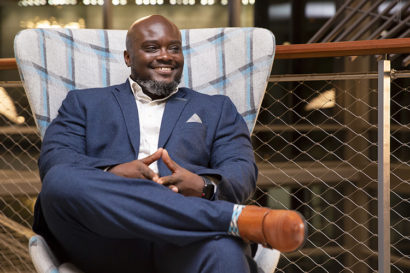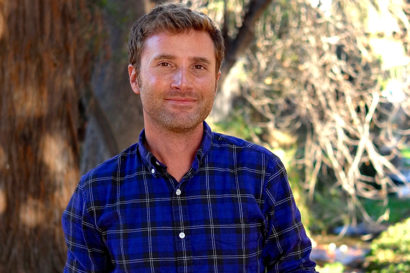UC Berkeley campus reacts to two Nobel Prize wins in one week
In just two days, UC Berkeley is two Nobel Prizes richer. Here are some reactions from the campus community
October 7, 2020

UC Berkeley biochemist Jennifer Doudna, who won the 2020 Nobel Prize in Chemistry on Wednesday, Oct. 7, celebrates with her staff and colleagues — in-person and via Zoom — at the Innovative Genomics Institute building at UC Berkeley. (UC Berkeley photo by Brittany Hosea-Small)
In just two days, UC Berkeley is two Nobel Prizes richer. On Wednesday, Oct. 7, Berkeley biochemist Jennifer Doudna won the 2020 Nobel Prize in Chemistry, with her colleague Emmanuelle Charpentier, for the co-development of CRISPR-Cas9, a revolutionary gene-editing tool that allows scientists to rewrite DNA. The day before, on Oct. 6, Reinhard Genzel, a Berkeley professor emeritus of physics and of astronomy and director of the Max Planck Institute for Extraterrestrial Physics in Garching, Germany, learned he would share half the 2020 Nobel Prize in Physics with UCLA professor Andrea Ghez “for the discovery of a supermassive compact object at the center of our galaxy.”
Here are some reactions from the campus community:
Carol Christ, chancellor of UC Berkeley
“I think what’s extraordinary is the range that these two prizes represent. In just two days, we have scientists awarded the Nobel for beginning to understand the black hole in the center of our galaxy, to the farthest reaches of the cosmos, to the most minute mechanisms within what the Nobel committee was calling the code of life. I think that’s extraordinary, and I’m so grateful that the University of California has an extraordinary role in these discoveries, particularly the women on the faculty of the University of California.”
Ryann McDowell, third-year student, majoring in molecular and cell biology
“Having Jennifer Doudna get the recognition she deserves feels like such a win — for the university, for genomics and for women in STEM, in general. She has been on my radar since high school. She’s somebody who I look up to. I aspire to be like her. As a woman in STEM, there aren’t that many role models, because it’s a very male-dominated field. So, being accepted at Berkeley, I was like, ‘Oh, my God, I get to go to the place where Jennifer Doudna is.’ Sometimes, as a Berkeley student, you forget that you’re breathing the same air as these incredible people.”
Khwal Rafique, second-year student, majoring in legal studies
“When I found out, I told my sister right away, and we were talking about how this is a prideful moment for Berkeley, and also, at the same time, we need to recognize the amount of resources and opportunities people need to have to achieve something like winning a Nobel Prize. I think one of the most important things we can learn from this would be, essentially, yes, let’s be happy … but at the same time, we need to continue the work of getting Black women and Indigenous women and women of color into these spaces. Given these resources and opportunities, they can be Berkeley’s next Nobel laureates.”
Michael Botchan, dean of biological sciences, professor of biochemistry, biophysics and structural biology
“It’s reassuring to know that there’s still joy in the world and that, given the chaos that we now have with the pandemic and the political system, our fight against racism, that we can see a public institution that has folks like Jennifer Doudna … who represent the best. … I’m proud of the human race and the arc of history is definitely going up.”
Marco Lindsey, associate director for diversity, equity and inclusion at the Haas School of Business
“It’s exciting. It’s inspirational. It’s one of the reasons that I have stayed at Berkeley for 13 years — the fact that, as a part of this community, you’re part of something that’s bigger than you. We have people in our midst who are doing things that are literally changing the world. As a member of this community, I’m reminded of what I have access to, and then I can remind our students what they have access to and what they can do, because now, we can point to someone who is a part of our community who has done something world-renowned. If there’s any subject on Earth that you can think of, here at Berkeley we have the foremost experts. And this announcement just further solidifies that. Not one, but two Nobels? It’s a really exciting time.”
Chung-Pei Ma, professor of astronomy and physics
From the mystery of the cosmos to the secret of life, it has been a truly inspiring two days for me, our students in the astronomy and physics departments and the next generation of aspiring scientists. Genzel’s and Ghez’s teams have provided beautifully inescapable evidence for the existence of a supermassive black hole. Despite its hefty mass of 4 million suns, this black hole is only the piccolo of a new orchestra. Their discovery is inspiring our ongoing exploration of the cosmic orchestra of black holes in other galaxies.
Gia White, administrative director for the Institute of European Studies
“My career at Berkeley has primarily been with the research wing of the campus, so I’ve seen the sustained dedication of our faculty and students first-hand. It’s so exciting because Reinhard Genzel is an affiliated faculty member with our unit. I think that we generally don’t get to see every day the fruits of the amazing research taking place on our campus. This kind of news brings that to the forefront, and it benefits not just our campus, but the world. When I saw Jennifer Doudna’s picture splashed across the homepage, I thought, ‘This is great.’ And it’s 150 Years of Women — it’s this month that UC Berkeley first admitted women to the campus, and there’s Doudna’s picture front and center, underscoring this full circle moment.”
Noah Whiteman, associate professor of integrative biology
“I was absolutely delighted that a team of women — Jennifer Doudna and Emmanuelle Charpentier — won the Nobel Prize for discovering CRISPR-Cas9. It is so richly deserved. There’s no question that many, many people were involved in the lead-up to make that discovery. You know, CRISPR is an ancient bacterial immune system, so it didn’t evolve to help us; it evolved to help bacteria conquer the world. But the discovery that it could be used as molecular scissors is truly a revolutionary one. I’m just thrilled. Teaching my students, they give me a lot of hope in every way for the future of our planet. They’re like Jennifer Doudna — they’re brilliant and genuinely wonderful people. She is just so talented in science as a leader, not just the discovery side, but actually leading a group of people toward a common goal. For me, this is just the beginning of her ascension in the pantheon of science goddesses.”




